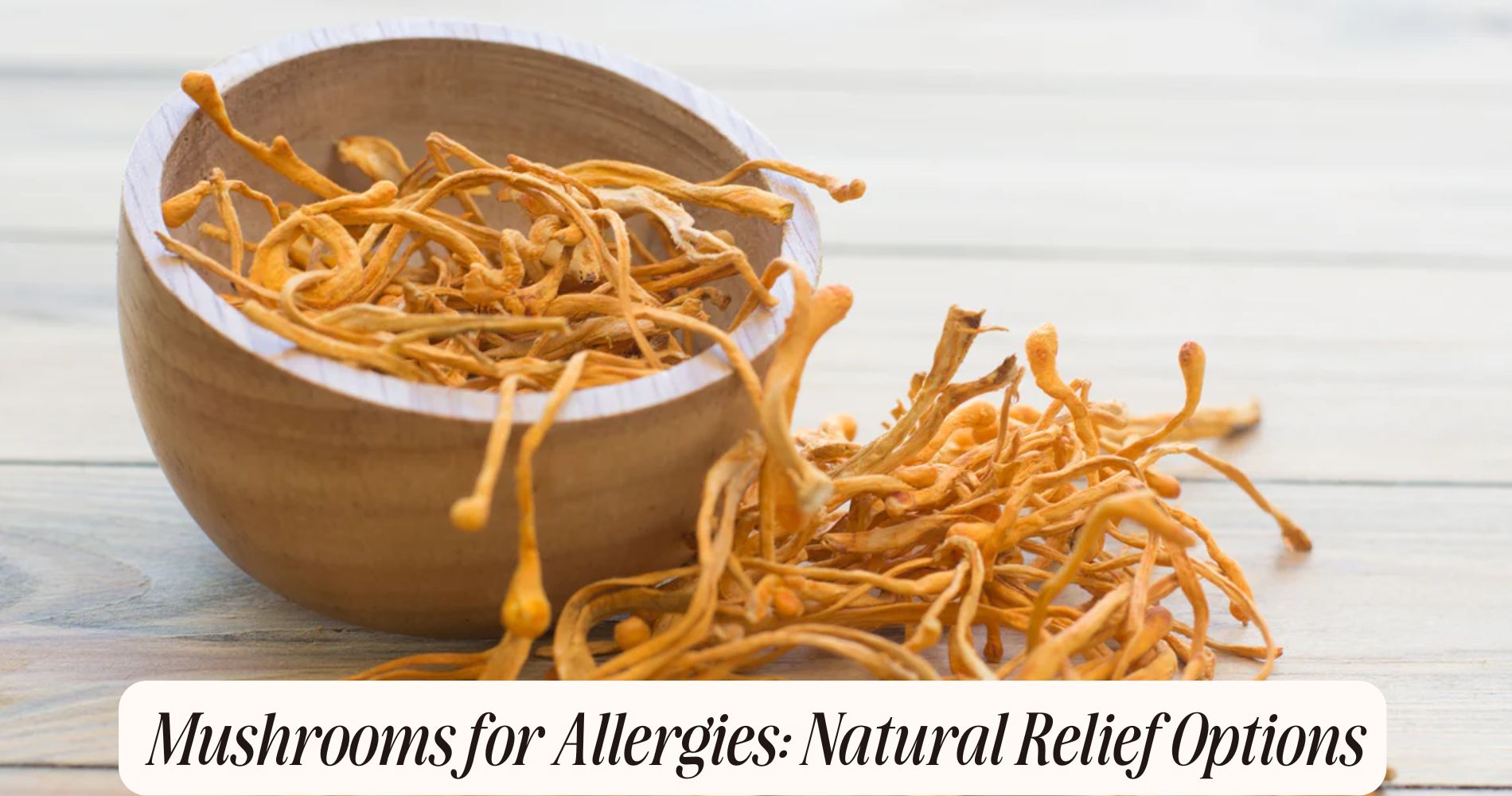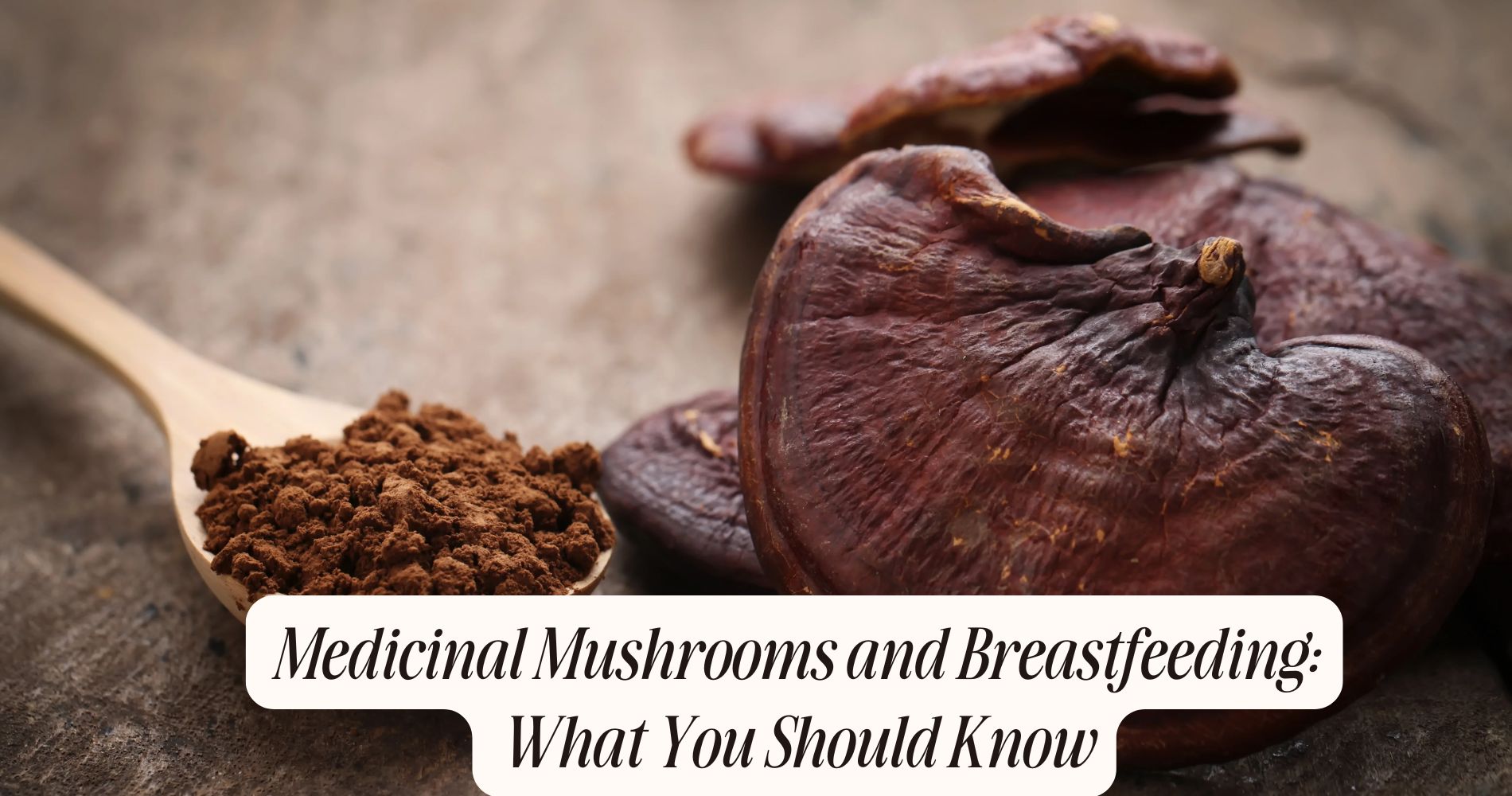
Mushrooms for Allergies: Natural Relief Options
Understanding Allergies
Allergies are complex immune responses triggered by substances known as allergens, which can range from pollen to certain foods. When you encounter an allergy trigger, your immune system mistakenly identifies it as a harmful substance. This leads to the production of antibodies, specifically Immunoglobulin E (IgE), which then binds to mast cells and basophils in your body.
Upon subsequent exposure to the same allergen, these cells release inflammatory mediators like histamine, resulting in symptoms such as itching, swelling, and respiratory distress. The severity of your immune response can vary based on factors like genetic predisposition and environmental influences.
Understanding your specific allergy triggers is essential. Common triggers include dust mites, animal dander, mold, and certain foods. By identifying and avoiding these allergens, you can greatly reduce the frequency and severity of your allergic reactions.
In some cases, medical interventions, such as antihistamines or immunotherapy, may be necessary to manage your symptoms effectively.
Staying informed about your allergies and how your immune response works empowers you to take control of your health and well-being.
The Role of Mushrooms
Mushrooms play an essential role in supporting your immune system, enhancing its ability to respond effectively to allergens.
Their anti-inflammatory properties help to reduce the body's inflammatory responses, which can alleviate allergy symptoms.
Understanding how these benefits contribute to your overall health can empower you to make informed choices about incorporating mushrooms into your diet.
Immune System Support
When it comes to supporting your immune system, certain fungi play a surprisingly essential role. Various mushroom types, like reishi, shiitake, and maitake, contain bioactive compounds that enhance your immune response.
These mushrooms are rich in polysaccharides, particularly beta-glucans, which have been shown to modulate the immune system effectively.
When you consume these mushrooms, their compounds interact with immune cells, activating pathways that bolster your body's defenses. For instance, beta-glucans stimulate macrophages and natural killer cells, key players in your immune response, enabling them to identify and eliminate pathogens more efficiently.

Additionally, some mushroom types provide antioxidants that further protect your immune system from oxidative stress, which can compromise its effectiveness.
Regularly incorporating these mushrooms into your diet can help maintain a balanced immune function, making it easier for your body to fend off allergies and infections.
Anti-Inflammatory Properties
How do certain fungi contribute to reducing inflammation in the body? Research shows that specific mushroom compounds, such as polysaccharides and triterpenes, play an essential role in modulating inflammatory responses.
When you consume these mushrooms, they interact with your immune system, helping to downregulate the production of pro-inflammatory cytokines. This process can greatly alleviate allergy symptoms, which often stem from excessive inflammation.
Mushrooms like reishi, shiitake, and cordyceps are particularly known for their anti-inflammatory properties. They contain bioactive compounds that not only enhance your immune response but also promote the healing of inflamed tissues.
By incorporating these mushrooms into your diet, you can harness their potential to combat inflammation and improve your overall health.
Additionally, the antioxidant properties of these fungi help neutralize free radicals that can exacerbate inflammatory conditions.
As you explore natural relief options for allergies, consider the benefits of these mushroom compounds. Regular consumption may help you experience reduced allergy symptoms and a more balanced immune response, ultimately leading to improved quality of life.
Immune System Support
Mushrooms provide significant immune system support through their immune-boosting properties, which enhance your body's ability to fend off allergens.
They contain antioxidants that help combat oxidative stress and reduce inflammation, further promoting overall health.
Immune Boosting Properties
Although many factors contribute to a robust immune system, incorporating mushrooms into your diet can greatly enhance your body's defenses. Various mushroom varieties, such as shiitake, reishi, and maitake, are known for their immune-boosting properties. These fungi contain polysaccharides, particularly beta-glucans, which stimulate the immune system by activating immune cells like macrophages and natural killer cells.
Regular consumption of these mushrooms can help improve your body's ability to fight off infections and reduce inflammation. Research indicates that the health benefits of mushrooms extend beyond mere immune support; they also promote overall wellness.
For instance, the compounds found in reishi mushrooms are recognized for their adaptogenic properties, helping the body manage stress and maintain homeostasis.

Incorporating a variety of mushrooms into your meals can be a simple yet effective strategy to enhance your immune function. Whether you choose to sauté shiitake in stir-fries or brew reishi tea, the health benefits are substantial.
Antioxidant Benefits
Packed with powerful antioxidants, mushrooms play an integral role in supporting your immune system. These natural compounds, like ergothioneine and glutathione, help combat oxidative stress, which can weaken your immune response.
When you're dealing with allergies, your immune system can become overstimulated, leading to inflammation and discomfort. Incorporating mushroom antioxidants into your diet can provide a buffer against this excessive immune activation.
Mushroom antioxidants work by neutralizing free radicals and reducing the overall oxidative load on your body. This is vital for maintaining ideal immune function, especially when you're exposed to allergens that trigger respiratory responses.
By fortifying your immune system, these antioxidants can enhance your body's ability to manage allergic reactions effectively.
Certain mushroom varieties, such as reishi, shiitake, and maitake, are particularly rich in these beneficial compounds. Regularly consuming these mushrooms can't only support your immune health but may also contribute to allergy relief.
Anti-Inflammatory Effects
The immune system's response to allergens often leads to inflammation, which can exacerbate symptoms and discomfort. By incorporating certain mushroom compounds into your diet, you can potentially achieve inflammation reduction and bolster your immune response.
Various mushrooms, such as reishi, shiitake, and lion's mane, contain bioactive compounds like polysaccharides and triterpenes that have been shown to modulate immune activity.
These mushroom compounds work by inhibiting the production of pro-inflammatory cytokines, which are key players in the inflammatory response. When you consume these mushrooms regularly, you may help your body manage its reaction to allergens more effectively.
Additionally, the anti-inflammatory properties of these compounds can promote a more balanced immune response, reducing the likelihood of overreactions to non-threatening substances.
Incorporating mushrooms into your meals or taking mushroom-based supplements can be a practical approach for inflammation reduction. This strategy not only addresses allergy symptoms but also enhances your overall wellness.
As you explore natural relief options, consider how these potent fungi can support your immune system and improve your quality of life.
Anti-Inflammatory Properties
Exploring the anti-inflammatory properties of mushrooms reveals their potential role in alleviating allergy symptoms. Various mushroom compounds, such as polysaccharides and triterpenoids, exhibit significant anti-inflammatory effects. These compounds can help modulate the immune response, reducing inflammation often associated with allergic reactions.
Incorporating mushrooms into your diet through culinary applications can be an effective strategy for harnessing these benefits. For instance, shiitake and reishi mushrooms are commonly used in soups and stir-fries, providing not only flavor but also a wealth of health benefits. Regular consumption of these mushrooms may enhance your body's ability to combat inflammation.

Research shows that specific mushroom extracts can inhibit pro-inflammatory cytokines, which play a vital role in allergic responses. By consuming mushrooms rich in these compounds, you could potentially lower your risk of experiencing severe allergy symptoms.
Key Mushroom Varieties
When considering mushrooms for allergy relief, certain varieties stand out due to their unique properties.
Shiitake benefits include immune modulation, which can help reduce the severity of allergic reactions. Their high content of polysaccharides strengthens your immune system, promoting overall health.
Reishi properties are significant as well; this mushroom is known for its anti-inflammatory and adaptogenic effects, helping your body cope with stress and allergens alike.
Lion's mane enhances nerve health and may improve cognitive function, which can be beneficial if allergies cause fatigue or brain fog.
Cordyceps effects include boosting energy levels and enhancing oxygen utilization, making you feel more resilient during allergy seasons.
Chaga uses extend to its ability to reduce oxidative stress, a contributing factor in allergic responses.
Finally, maitake advantages are substantial, as this mushroom helps regulate blood sugar and supports immune function, which is vital for allergy management.
Incorporating these key varieties into your wellness routine can provide a natural approach to alleviating allergy symptoms while supporting your overall health.
How to Use Mushrooms
Incorporating mushrooms into your daily routine can enhance their health benefits, especially for allergy relief. You can utilize various mushroom preparation methods to maximize their effects. Fresh mushrooms, such as shiitake, reishi, and maitake, are excellent for culinary uses. You can sauté them with vegetables, add them to soups, or blend them into smoothies for a nutritious boost.
Dried mushrooms are another option, offering concentrated health benefits. Rehydrate them in warm water for use in stir-fries or stews. If you prefer a more potent form, consider mushroom powders or extracts. These can be easily mixed into beverages or sprinkled on your meals.

When cooking, aim for gentle heat to preserve the beneficial compounds. Avoid overcooking, as this can diminish their efficacy. You might also explore mushroom capsules or teas for convenience, particularly if you're on the go.
Incorporating these diverse preparation methods into your diet not only enhances flavor but also supports your immune system, potentially alleviating allergy symptoms.
Start small, and gradually increase your intake to experience the full benefits of mushrooms in your health regimen.
Potential Side Effects
While mushrooms offer numerous health benefits, it's vital to be aware of potential side effects that may arise from their consumption. One of the primary concerns is the risk of mushroom allergies. If you have a known allergy to mushrooms, consuming any type could trigger reactions ranging from mild gastrointestinal distress to severe anaphylaxis.
It's important to recognize the specific type of mushroom that may provoke such allergies, as reactions can vary greatly.
Additionally, consider potential interactions with medications. Certain mushrooms, particularly medicinal varieties like reishi or shiitake, may influence blood sugar levels or anticoagulant medications. This could lead to unexpected effects if you're managing conditions such as diabetes or are on blood thinners.
It's wise to consult a healthcare professional before incorporating mushrooms into your routine, especially if you're on medication.
Lastly, some mushrooms can cause gastrointestinal discomfort, especially when consumed in large quantities. Symptoms may include nausea, bloating, or diarrhea.
Monitoring your body's response to mushrooms is key to ensuring a safe and beneficial experience while exploring their health potential.
Scientific Research Findings
Recent scientific research has highlighted the potential benefits of mushrooms in alleviating allergies and enhancing immune function. Studies have examined various mushroom compounds, such as polysaccharides and triterpenoids, which may modulate immune responses and influence allergy mechanisms.
For instance, beta-glucans found in specific mushroom species have shown promise in reducing inflammation and histamine release, two critical factors in allergic reactions.
Research indicates that these mushroom compounds can enhance the activity of immune cells like macrophages and dendritic cells. By doing so, they help your body better regulate immune responses, potentially leading to fewer allergy symptoms.
Additionally, certain mushrooms, like reishi and shiitake, have demonstrated the ability to inhibit the production of pro-inflammatory cytokines, which play a significant role in allergy mechanisms.

Furthermore, preliminary studies have suggested that some mushroom extracts may improve respiratory function and reduce the severity of allergic rhinitis.
Integrating Mushrooms Into Your Diet
To reap the benefits of mushrooms for allergy relief, you can easily weave them into your daily meals. Start by incorporating a variety of mushrooms, such as shiitake, reishi, or maitake, known for their immune-boosting properties.
One effective approach is to explore diverse mushroom recipes that highlight their flavors and health benefits. For breakfast, consider adding sautéed mushrooms to your omelet or mixing them into oatmeal for a savory twist.
At lunch, a mushroom-based soup or salad can serve as a nutritious option. For dinner, try a stir-fry featuring a combination of vegetables and your favorite mushrooms.
When integrating mushrooms into your diet, focus on portion control. Aim for at least half a cup of mushrooms per meal to maximize their allergy-fighting potential.
Additionally, experiment with dried mushrooms, which can intensify flavor and provide concentrated nutrients.
Lastly, keep dietary tips in mind: always wash mushrooms thoroughly, and consider cooking them to enhance their digestibility.
Natural Allergy Relief with SUPER MUSHROOM GUMMIES
Exploring mushrooms for allergies? Well Gummies’ SUPER MUSHROOM GUMMIES offer a convenient way to harness the power of 10 functional mushrooms to help support immune health and provide natural relief. These easy-to-chew gummies deliver calm energy, sharper focus, and balanced support for your body—all in a delicious wild berry flavor. With no jitters or crash, they're a tasty way to enhance your wellness and tackle allergy symptoms naturally. Try them today to experience the benefits of nature’s best mushrooms in one simple chew!
Frequently Asked Questions
Can Mushrooms Interact With Allergy Medications?
Mushrooms can cause interactions with allergy medications, potentially amplifying or diminishing their effects. You should monitor your allergy symptoms closely and consult a healthcare professional if you're considering integrating mushrooms into your regimen.
Are There Specific Mushrooms for Seasonal Allergies?
Yes, specific mushroom varieties like reishi and cordyceps provide immune support, potentially alleviating seasonal allergies. Their bioactive compounds enhance immune function, helping your body respond better to allergens and reducing symptoms effectively.
How Quickly Can Mushrooms Relieve Allergy Symptoms?
Mushroom varieties can potentially relieve allergy symptoms quickly, depending on the individual's response. They may interact with allergy mechanisms, reducing inflammation and histamine release, but results vary based on factors like dosage and personal sensitivity.
Are Mushroom Supplements Safe for Children With Allergies?
When considering mushroom supplements for children with allergies, consult a healthcare provider. Certain mushroom types can interact with medications or exacerbate allergy symptoms, so professional guidance guarantees safety and appropriateness for your child's specific needs.
What Are the Best Ways to Store Mushrooms for Potency?
To preserve mushroom potency, store them in a cool, dark place, preferably in paper bags or airtight containers. Avoid moisture and direct sunlight, as these factors can degrade their quality and effectiveness over time.
Conclusion
Incorporating mushrooms into your diet can be a powerful natural remedy for managing allergies. Their immune-boosting and anti-inflammatory properties may provide significant relief from allergy symptoms. By selecting key varieties and exploring various preparation methods, you can enhance your overall well-being. However, it's crucial to stay informed about potential side effects and consult scientific research to guarantee effective use. Embracing mushrooms as a holistic approach can lead to improved allergy management and a healthier lifestyle.




